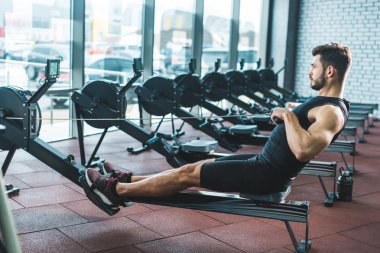
How To Lose Weight On Concept2 Rower (10 Useful Guidelines)
How to Lose Weight on Concept2 Rower: Transform your fitness journey with this dynamic machine by integrating high-intensity interval training (HIIT) routines tailored to torch calories effectively. Discover the secrets to maximizing fat loss and sculpting a lean physique as you harness the power of the Concept2 Rower. Embarking on a journey to lose weight often feels like navigating a labyrinth of conflicting advice and daunting workouts.
But what if someone told you that shedding those stubborn pounds could be as exhilarating as gliding across serene waters? Enter the Concept2 Rower, a powerhouse of a machine that not only torches calories but also transforms mundane workouts into thrilling adventures. Strap in as you delve into the dynamic realm of weight loss on the Concept2 Rower, where every stroke propels you closer to your fitness goals with the grace of a seasoned rower and the efficiency of a well-oiled machine.
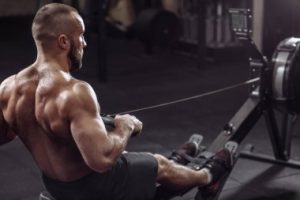
How To Lose Weight On Concept2 Rower
To lose weight on the Concept2 Rower, focus on incorporating high-intensity interval training (HIIT) sessions, maintaining proper form, monitoring progress, prioritizing nutrition and hydration, and maintaining consistency in your workouts. By combining these strategies, you can maximize calorie burn, optimize muscle engagement, and achieve sustainable weight loss results.
High-Intensity Interval Training (HIIT) Sessions
Incorporating HIIT sessions into your rowing routine can significantly boost calorie burn and fat loss. Alternate between periods of intense rowing and active recovery to elevate your heart rate and metabolism, maximizing your calorie expenditure during and after your workout.
Focus on Form
Maintaining proper form is crucial for optimizing your workouts and preventing injuries. Pay attention to your posture, grip, and leg drive to ensure efficient rowing technique. Engaging your core and utilizing the full range of motion will help target muscles effectively and enhance calorie burn.
Monitor Progress
Tracking your progress is essential for staying motivated and making necessary adjustments to your routine. Keep a record of your rowing sessions, including duration, distance, and intensity. Set achievable goals and celebrate milestones to maintain momentum on your weight loss journey.
Nutrition and Hydration
Pairing your rowing workouts with a balanced diet rich in whole foods will support your weight loss efforts. Prioritize lean proteins, complex carbohydrates, and healthy fats to fuel your workouts and promote muscle recovery. Stay hydrated by drinking plenty of water throughout the day to optimize performance and metabolism.
Consistency is Key
Consistency is key when it comes to achieving sustainable weight loss results. Aim for regular rowing sessions, gradually increasing intensity and duration as your fitness improves. Find a schedule that works for you and prioritize your workouts to stay on track towards your weight loss goals.
Understanding Weight Loss on the Concept2 Rower
Basics of Weight Loss
Weight loss fundamentally revolves around creating a calorie deficit, where you consume fewer calories than your body expends. This can be achieved through a combination of dietary adjustments and increased physical activity. A balanced diet rich in whole foods like fruits, vegetables, lean proteins, and whole grains is essential for providing necessary nutrients while managing calorie intake.
Portion control and mindful eating habits can also play a crucial role. Regular exercise not only burns calories but also boosts metabolism and helps preserve lean muscle mass. Additionally, staying hydrated, getting adequate sleep, and managing stress levels are important factors that can influence weight loss success. It’s important to approach weight loss with patience, consistency, and a focus on long-term lifestyle changes rather than quick fixes or extreme measures.
Benefits of Concept2 Rower for Weight Loss
The Concept2 Rower offers a myriad of benefits for weight loss enthusiasts. Firstly, its versatility ensures a full-body workout, engaging major muscle groups like legs, arms, back, and core simultaneously, maximizing calorie burn and fat loss potential. Its low-impact nature reduces stress on joints, making it suitable for individuals of all fitness levels.
The rower allows for customizable resistance levels, enabling users to progressively challenge themselves as they get stronger, thus enhancing endurance and promoting sustainable weight loss. Additionally, rowing promotes cardiovascular health by improving heart and lung function, facilitating better oxygen utilization, and boosting metabolism even after the workout ends. With its compact design, the Concept2 Rower fits seamlessly into any home gym setup, providing convenient access to an effective tool for achieving weight loss goals.
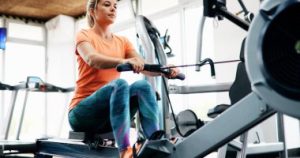
Setting Goals
Setting SMART Goals
Setting SMART goals for weight loss is crucial for success in achieving a healthier lifestyle. SMART goals are Specific, Measurable, Achievable, Relevant, and Time-bound. When establishing these goals, it’s important to be specific about what you want to achieve, whether it’s losing a certain number of pounds or inches. Measuring progress is essential, as it allows you to track your success and make necessary adjustments along the way.
Ensure that your goals are achievable and realistic, considering your current lifestyle, resources, and capabilities. Additionally, make sure your weight loss goals align with your overall health objectives and are relevant to your well-being. Lastly, set a timeframe for reaching each goal to create a sense of urgency and motivation. By setting SMART goals for weight loss, you can enhance your focus, stay motivated, and ultimately achieve long-term success in managing your weight and improving your health.
Tracking Progress:
To monitor progress effectively, consider using metrics such as weight, body measurements, and performance indicators like rowing speed. Utilizing technology such as Concept2’s Performance Monitor can streamline data tracking, offering insights into your progress over time. By tracking your progress consistently, you can stay motivated and make necessary adjustments to achieve your goals efficiently.
Creating a Workout Plan
Creating an effective workout plan for weight loss on a rowing machine involves a strategic combination of intensity, duration, and consistency. Begin by establishing achievable goals and assessing your current fitness level to tailor the plan accordingly. Incorporate a mix of steady-state cardio sessions for endurance building and high-intensity interval training (HIIT) for calorie burning and metabolic boosting.
Start with a warm-up to prepare your muscles and joints, then alternate between periods of intense rowing and active recovery. Gradually increase the duration and intensity as your fitness improves. Remember to prioritize proper form to prevent injury and maximize efficiency. Consistency is key, so aim for regular workouts and monitor your progress to make necessary adjustments along the way. Additionally, complement your rowing routine with a balanced diet to enhance weight loss results and overall well-being.
Technique and Form
Proper Rowing Technique
Proper rowing technique is essential for maximizing the benefits of this full-body workout while minimizing the risk of injury. The catch phase initiates the stroke, where the rower’s body leans forward with knees bent and shins vertical, arms extended, and gripping the handle firmly. As the drive begins, power is generated from the legs pushing against the foot pedals, followed by a controlled movement of the arms pulling the handle towards the body, engaging the core muscles throughout.
The finish marks the completion of the stroke, with the legs fully extended, the torso slightly leaning back, and the handle pulled towards the lower ribcage. Finally, the recovery phase allows the body to reset for the next stroke by extending the arms forward, leaning the torso forward, and sliding the seat back to the catch position. Consistency in executing these phases with proper form not only enhances calorie burn and muscle engagement but also reduces the risk of overuse injuries, making rowing an effective tool in weight loss endeavors.
Avoiding Common Mistakes
To excel in rowing machine workouts, it’s essential to sidestep common pitfalls that can hinder your progress. Firstly, maintaining proper posture is paramount; slouching not only compromises technique but also invites potential injury. Secondly, be mindful of overreaching during the stroke. While extending your reach is crucial for maximizing power, excessive stretching can strain muscles and compromise form.
Finding the sweet spot for resistance is equally important; using too much can lead to fatigue or even injury, while too little might not provide sufficient challenge for progress. By staying mindful of these three common mistakes—slouching, overreaching, and resistance imbalance—you can optimize your rowing experience for maximum efficiency and safety.
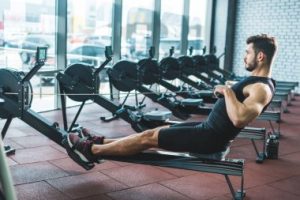
Nutrition
Caloric intake
Nutrition is the cornerstone of overall health and well-being, with caloric intake playing a pivotal role in maintaining a balanced diet. The concept of creating a calorie deficit is fundamental in the realm of weight loss. By consuming fewer calories than the body expends, individuals aim to shed excess weight effectively.
This deficit can be achieved through a combination of mindful eating, portion control, and incorporating nutrient-dense foods into one’s diet. However, it’s crucial to strike a balance, ensuring that the body receives adequate nutrition despite the calorie reduction. Consulting with a healthcare professional or nutritionist can provide personalized guidance on creating a sustainable and healthy calorie deficit for achieving weight loss goals while maintaining overall health.
Macronutrient Balance
Macronutrient balance refers to the proportionate intake of carbohydrates, proteins, and fats in one’s diet to support optimal health and function. Each macronutrient plays a crucial role in the body: carbohydrates provide energy, proteins aid in tissue repair and growth, and fats are essential for cell structure and hormone production.
Achieving the right balance of these macronutrients is vital for maintaining a healthy weight, supporting metabolic processes, and preventing chronic diseases. A balanced diet typically consists of a variety of whole foods such as fruits, vegetables, lean proteins, whole grains, and healthy fats, with proportions tailored to individual needs and goals. Striking the right macronutrient balance ensures sustained energy levels, proper nutrient absorption, and overall well-being.
Hydration
Hydration is the cornerstone of optimal health and well-being. It entails maintaining a proper balance of water in the body, crucial for various physiological functions. Adequate hydration supports cognitive function, regulates body temperature, aids digestion, and promotes overall cellular function. Insufficient hydration can lead to fatigue, impaired concentration, headaches, and even more severe consequences like heat-related illnesses. It’s essential to replenish lost fluids regularly, especially during physical activity or in hot climates. Water remains the best choice for hydration, but other beverages like herbal teas and electrolyte-rich drinks can also contribute. Making a conscious effort to prioritize hydration throughout the day is key to sustaining vitality and promoting overall health.
Recovery and Rest
Importance of Recovery
Recovery and rest are paramount after engaging in rowing for weight loss. Rowing places significant demands on the body, activating multiple muscle groups and elevating heart rate. To optimize the benefits of this exercise and support weight loss goals, adequate rest is crucial. Rest allows the body to repair and rebuild muscle tissues, replenish glycogen stores, and regulate hormone levels essential for metabolism and fat loss.
Moreover, prioritizing recovery helps prevent injuries and fatigue, ensuring sustained progress towards weight loss objectives. Adequate sleep, hydration, and nutrition are integral components of the recovery process, fostering optimal physical and mental well-being. By incorporating sufficient rest into their routine, individuals can enhance the effectiveness of rowing as a tool for weight loss while promoting overall health and vitality.
Active Recovery
Active recovery in rowing is a strategic approach that can significantly enhance weight loss efforts. By incorporating low-intensity rowing sessions between high-intensity workouts, individuals can optimize their metabolism and promote fat burning. This technique not only aids in flushing out metabolic waste and reducing muscle soreness but also maintains cardiovascular health and endurance.
Additionally, active recovery sessions allow for increased calorie expenditure without overstressing the body, thus supporting sustainable weight loss goals. By embracing active recovery in rowing, enthusiasts can strike a balance between intensity and recovery, paving the way for improved fitness levels and long-term weight management success.
Mental Health and Motivation
Mental health plays a pivotal role in the pursuit of weight loss through rowing, intertwining with motivation to sculpt a holistic approach to fitness. Rowing, with its rhythmic motion and full-body engagement, serves not only as a physical exercise but also as a conduit for mental well-being. The repetitive nature of rowing fosters a meditative state, calming the mind and reducing stress—an essential component in maintaining motivation.
Furthermore, the sense of achievement and progress derived from each stroke fuels motivation, acting as a beacon towards weight loss goals. Cultivating a positive mindset, bolstered by the endorphin release inherent in physical activity, strengthens resilience against setbacks and enhances adherence to a weight loss regimen. Thus, by nurturing mental health alongside physical exertion, rowing becomes not just a means to an end but a journey of self-discovery and empowerment.
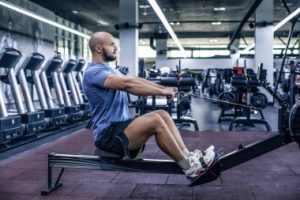
Monitoring and Adjusting
Monitoring and adjusting in rowing involves a multifaceted approach that integrates consistent tracking of progress and fine-tuning of both technique and training regimen. Effective monitoring encompasses keeping tabs on key metrics such as distance covered, stroke rate, heart rate, and duration of workouts. Additionally, it involves maintaining a detailed record of dietary intake and hydration levels to ensure optimal fueling for workouts and recovery.
Adjustments in rowing technique may be necessary to optimize calorie expenditure and muscle engagement while minimizing the risk of injury. Furthermore, adapting the intensity and duration of rowing sessions based on individual fitness levels and weight loss goals is essential. This iterative process of monitoring and adjusting empowers individuals to make informed decisions, stay motivated, and achieve sustainable weight loss results through rowing.
Long-Term Maintenance
Lifestyle Changes
Lifestyle changes encompass a holistic shift towards sustainable habits that prioritize both physical and mental well-being. Central to this transformation are choices regarding diet and exercise, aiming for sustainability and longevity rather than quick fixes. Adopting a sustainable diet rich in whole foods and mindful of environmental impact fosters not only personal health but also planetary well-being.
Pairing this with consistent exercise habits, where activities like rowing emerge as enjoyable pursuits, ensures adherence and consistency. Rowing, with its rhythmic motion and full-body engagement, becomes not just a means of fitness but a source of pleasure, enhancing motivation and commitment to long-term health goals. By embracing these lifestyle changes, individuals forge a path towards a balanced and fulfilling existence.
Continued Learning and Improvement
Continued learning and improvement are vital components of any fitness journey. One effective way to achieve progress is by exploring new rowing workouts and techniques, constantly challenging oneself to break through plateaus and enhance performance. By staying informed about the latest nutrition and fitness trends, individuals can optimize their training regimens and fuel their bodies for optimal results. Whether it’s experimenting with different stroke techniques or incorporating innovative training methods, the pursuit of knowledge and adaptation is key to achieving sustainable growth and success in rowing and overall fitness endeavors.
FAQ: How To Lose Weight On Concept2 Rower
Q1. How effective is rowing on a Concept2 Rower for weight loss?
A. Rowing on a Concept2 Rower is highly effective for weight loss as it engages multiple muscle groups and provides a high-intensity cardiovascular workout, helping to burn calories efficiently.
Q2. How often should I row on the Concept2 Rower to see weight loss results?
A. For weight loss results, aim to row on the Concept2 Rower at least 3 to 5 times per week, with sessions lasting between 20 to 60 minutes depending on your fitness level and goals.
Q3. Is there a specific rowing technique I should follow for weight loss?
A. While rowing technique is important for maximizing results and preventing injury, there isn’t a specific technique solely for weight loss. Focus on maintaining proper form, including posture, leg drive, and arm extension, throughout each stroke.
Q4. Should I incorporate other exercises alongside rowing to lose weight effectively?
A. While rowing alone can be effective for weight loss, incorporating a balanced exercise routine that includes strength training and flexibility exercises can enhance results and overall fitness.
Q5. What should I eat before and after rowing sessions to support weight loss?
A. Before rowing, opt for a light meal or snack that includes carbohydrates for energy and a small amount of protein. After rowing, focus on replenishing glycogen stores with a meal that includes carbohydrates and lean protein to support muscle recovery.
Q6. How can I track my progress while using the Concept2 Rower for weight loss?
A. Utilize the Concept2 Rower’s performance monitor to track metrics such as distance, time, and calories burned during each session. Additionally, keep a record of your workouts and measurements to monitor progress over time.
Q7. Are there any specific rowing workouts I should follow for weight loss?
A. Incorporate a variety of rowing workouts into your routine, including steady-state endurance sessions, interval training, and high-intensity interval workouts (HIIT), to maximize calorie burn and prevent plateaus in weight loss progress.
Q8. How can I stay motivated while rowing for weight loss?
A. Set achievable goals, both short-term and long-term, and vary your workouts to keep things interesting. Additionally, consider joining a rowing club or finding a workout buddy for accountability and support.
Q9. Are there any precautions I should take when rowing for weight loss?
A. Ensure that you warm up properly before each rowing session to prevent injury, and listen to your body’s cues to avoid overtraining. If you have any underlying health conditions or concerns, consult with a healthcare professional before starting any new exercise program.
Q10. How long does it typically take to see weight loss results from rowing on the Concept2 Rower?
Weight loss results can vary depending on factors such as diet, exercise consistency, and individual metabolism. However, with regular rowing workouts and a balanced diet, many people start to notice changes in their weight and body composition within a few weeks to a couple of months.
Conclusion
In conclusion, incorporating the Concept2 Rower into your weight loss journey can be an effective and rewarding endeavor. By adhering to a structured workout plan, focusing on proper technique, and maintaining a balanced diet, you can optimize your efforts and achieve your weight loss goals. The versatility and efficiency of the Concept2 Rower make it a valuable tool for enhancing cardiovascular health, building muscle strength, and promoting overall well-being. With dedication, consistency, and a commitment to healthy living, the Concept2 Rower can serve as a cornerstone in your quest for a healthier, more vibrant lifestyle.